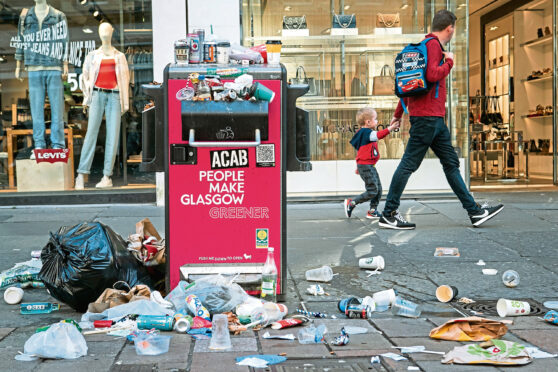
Schools must close during support staff’s planned strike action next month to keep pupils and teachers safe, according to Scotland’s biggest teaching union.
Andrea Bradley, general secretary of the Educational Institute of Scotland (EIS), said schools would not be able to open safely during the strikes in September.
She spoke out after unions representing workers including school catering staff, cleaners, caretakers, teaching assistants and early years practitioners said they will go on strike for three days next month in a row over pay. The news comes amid growing concerns over the ongoing bin strikes which have left Glasgow and Edinburgh city centres looking like rubbish tips.
Bradley said: “The EIS believes that schools should close during the support staff industrial action, on health and safety grounds. The staff who will be taking industrial action play a vital role in ensuring the health and safety of pupils and staff, so it is difficult to see how schools can open safely during this time.
“Where a headteacher or council takes the decision to open a school on a strike day, they must be able to demonstrate clearly that this can be done safely without any risk to the health and safety of pupils or staff or the security of school buildings.
“The EIS has issued information to members regarding the support staff strike, including the very clear advice not to carry out any work normally undertaken by a member of support staff engaged in industrial action.”
Edinburgh rubbish ‘deeply concerning’ says Swinney as council strikes escalate
The strike means all primary schools and nurseries in Scotland’s largest city will close for the three days. Glasgow City Council announced the closures but other local authorities have not decided whether schools will be closed. Unison and the GMB said members will strike on September 6 to 8 after talks with council body Cosla failed to reach agreement.
Unison said 13,000 school and early years staff will join waste and recycling workers who have already started strike action.
It will see schools, early years centres and nurseries disrupted in Aberdeenshire, Clackmannanshire, East Renfrewshire, Glasgow City, Inverclyde, Orkney, North Lanarkshire, South Lanarkshire and Stirling.
Local authorities initially proposed a 3.5% increase before increasing their offer to 5%, with the minimum hourly rate also to be raised to £10.50.
But unions called for great clarity on how it will affect the lowest paid workers.
The EIS have also announced plans to seek authorisation from the National Executive to open a consultative ballot of union members.
Greg Dempster, general secretary of the Association of Headteachers and Deputes in Scotland (AHDS), said: “Headteachers in affected establishments will be working with trade union representatives and the local authority to assess whether it is safe for schools and nurseries to open based on expected staffing on the planned days of action.”
Professor Lindsay Paterson, an education policy expert at Edinburgh University, said: “Any further school closures will make worse the already dire legacy of the Covid disruption.”
Meanwhile the bin strikes have been declared a “risk to human health” with councils told to decontaminate affected areas and people warned to avoid contact with heaps of rubbish on the streets.
Public Health Scotland published a warning as 21 of 32 councils were hit by refuse staff walking out in a pay row. The industrial unrest spread on Friday with waste workers in seven more council areas walking out.
Unite warned that members, due to end their current action on August 31, will strike for another eight days from September 6. GMB Scotland members in 16 council areas walked out for four days of action until Monday.
Striking bin lorry driver Barry McAreavey said any pay increase would go towards paying soaring bills.
He has worked for Glasgow City Council since 1996 and earns £1,750 a month after tax.
He and his partner Donna Byrne face an increase in their energy bills from £110 a month to £182 for their three-bedroom house in the city.
The 42-year-old GMB shop steward said: “Rents and energy prices are rising so much that members are coming to us in absolute destitution.
“They are having to go to food banks or take out emergency loans. That is another worry – people taking out payday loans and ending up in an even worse situation.
“I’m genuinely worried as well. I have two young boys and in this modern world they have all these electronic devices burning electricity. At the same time, you don’t want to steal their lives away from them.
“When the bills come in, we’ll just have to deal with them as best we can.
“What’s frustrating for a lot of people is that the rest of Europe seems to be dealing with this a lot better. It’s only in this country that we are basically being told to suck it up.”
Piles of rubbish have mounted up in Edinburgh since the strike began earlier this month and are now appearing in Glasgow.
Tourists Gary Lane, 53, and Yolinde Musgrave, 54, from Johannesburg, were visiting Glasgow for the first time yesterday. Musgrave said: “I thought maybe it was always like this but we were relieved when we heard there was a strike on. The city is so beautiful. It was a real shock at first. I just hope they can resolve the strike soon.”
The Scottish Government said: “We are committed to supporting a fair pay offer for teachers through the Scottish Negotiating Committee for Teachers.
“It is for local government, as the employer, to make any revised offer of pay.
“Industrial action would not be in anyone’s interest, least of all learners and parents.”

Enjoy the convenience of having The Sunday Post delivered as a digital ePaper straight to your smartphone, tablet or computer.
Subscribe for only £5.49 a month and enjoy all the benefits of the printed paper as a digital replica.
Subscribe